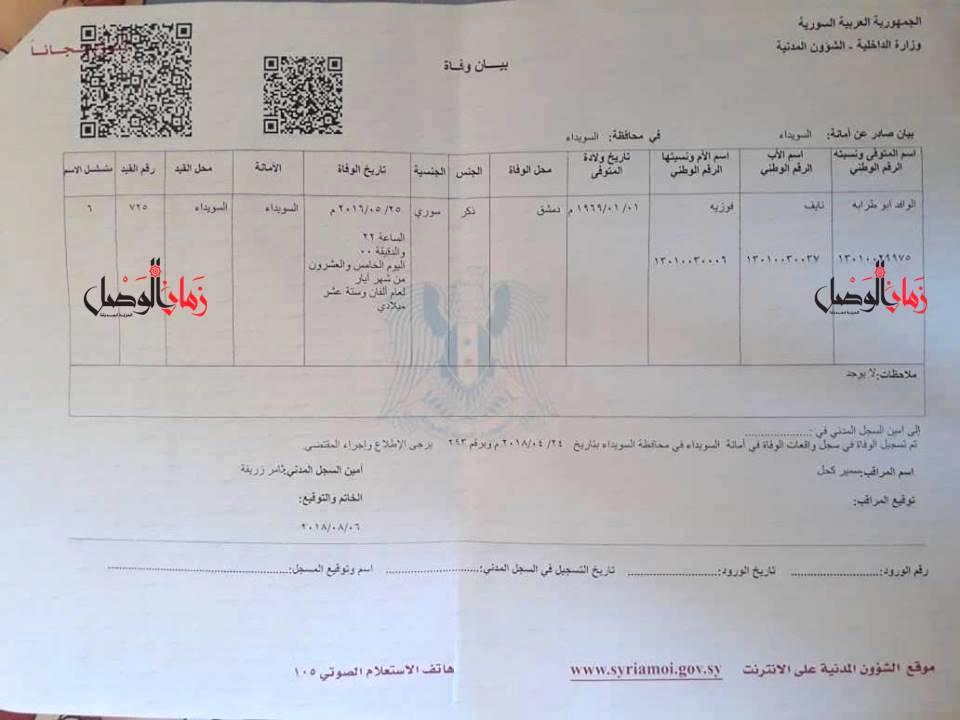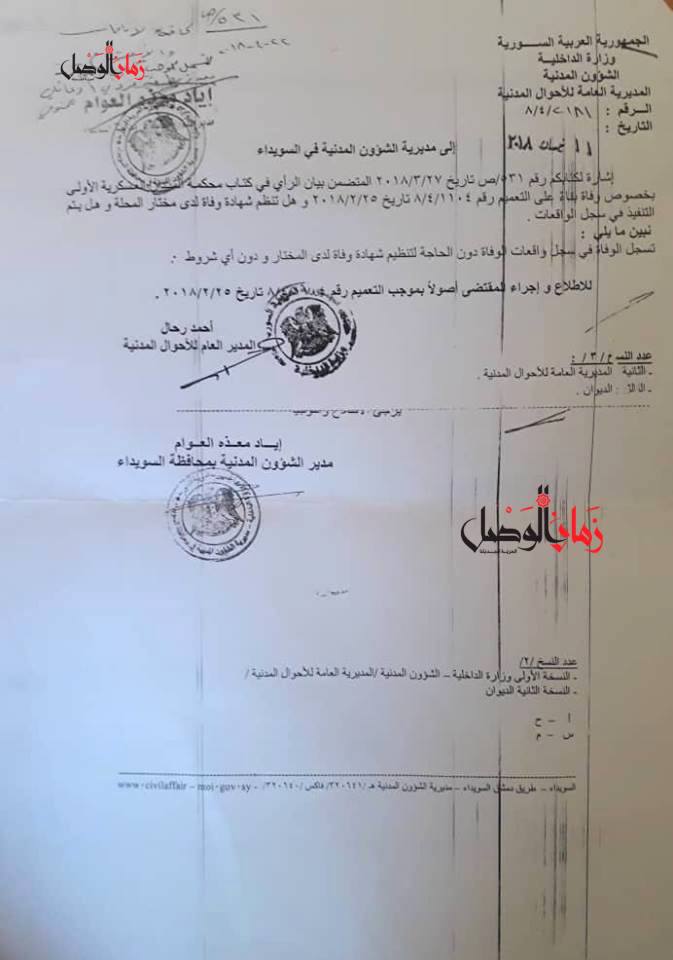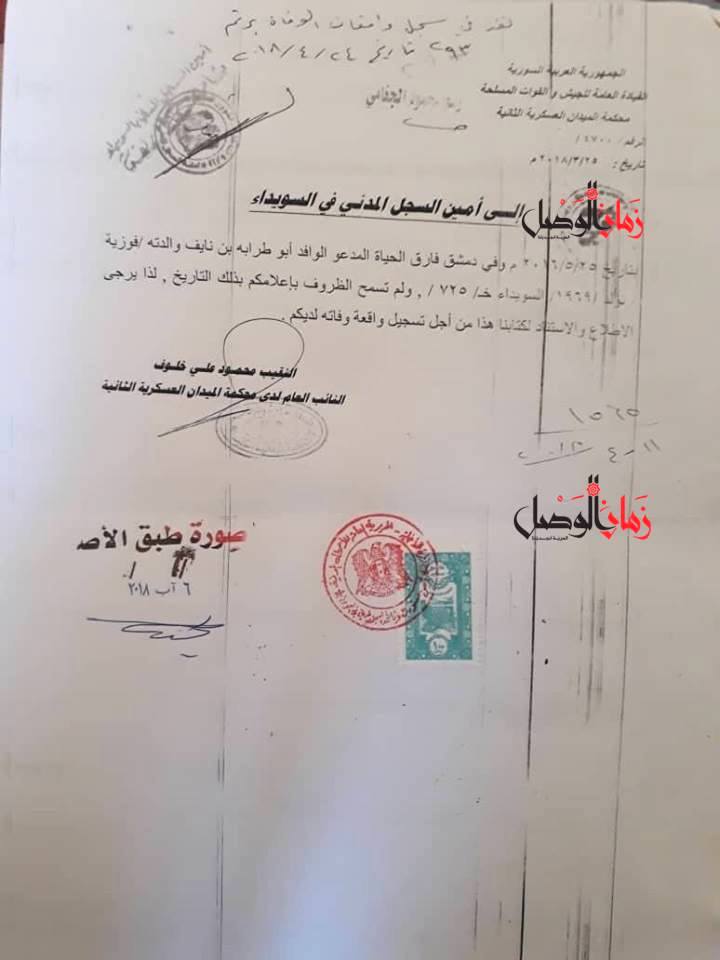(Zaman Al Wasl)- Many Syrians know little or nothing about Alwafed Abu Traba, the Druze man who appeared on the state-run TV in 2015, admitting his involvement in terrorist attacks in Sweida, the historic stronghold of Druze community in southern Syria.
Abu Traba was confirmed dead by the Suweida’s civil registry office this week, dating his death certificate to Feb 25, 2016, which was issued by the Second Military Court in Damascus, the notorious tribunal that sentenced thousands of Bashar al-Assad’s opponents to death and life imprisonment.
The cause of death for the Assad’s detainees has never been reported in official documents, to hide cases of torture and field executions.
Check the names of 8000 detainees who were tortured to death by the Syrian regime security.
At the early days of the Syrian revolution in 2011, Abu Traba (1969-2016) joined the Sweida’s rebels, led by the First Lieutenant, Khaldoun Zein al-Din. He called for unity among the Druze community against the regime atrocities what exposed him to several assassination attempts.
Abu Traba fled the war-torn country for three years where he lived in Jordan, Egypt and Turkey before returning back home in 2015.

Abu Traba was a close aide to Sheikh Wahid al-Balous, the prominent political and spiritual leader of Druze community, who was killed on September 4, 2015 in suspected regime blast.
At the aftermath of the blast, Abu Traba had rallied hundreds of angry people against Assad, accusing him of killing al-Balous and stirring strife among Druze people.
Al-Balous opposed regime war against the Syrian people and called on his fellow Druze men to escape military conscription.
In retaliation, the Syrian Military Division ambushed Abu Traba in coordination with pro-regime Druze clerics in Sweida.
Few weeks later, Abu Traba was charged with plotting terrorist attacks and rebellion, delivering his the forcibly-retracted concession via the state TV.
Death certificates have been sweeping the registry offices. Most of the detainees were tortured to death by the Assad regime.
The Assad regime has been issuing death certificates for detainees tortured to death for prisoners tortured to death, sources said.
Zaman al-Wasl and The Gathering of Free Syrian Advocates have obtained names of 145 detainees were tortured to death as the regime ordered the civil registry office in Hama
province to issue death certificates for the detainees which ignore the reason of death.
The advocate group has submitted the list to the United Nations, saying the regime security centers are a place for a genocide and ethnic cleansing.
According to the Syrian Network for Human Rights, 81,652 Syrian citizens were forcibly disappeared at the hands of the Syrian regime alone between March 2011 and June 2018, while around 13,066 victims died due to torture at the Syrian regime’s official and non-official prisons in the same period of time.
Mohamed Nour Hmaidi, head of the Syrian Justice Gathering and the former head of Public Prosecution in Idlib province, said the regime is seeking to conceal its crimes backed by Iran and Russia as Assad thinks the war is over.
The death certificates were part of the post-war plans, Hamaidi said as about 600,000 Syrian are believed to be behind the bars.
The U.N. said in its reports over Syrian detainees that the scale of deaths in prisons indicated that the Assad regime was responsible for “extermination as a crime against humanity”.
The International Amnesty accused the Syrian regime of carrying out a "policy of extermination", repeatedly torturing detainees and withholding food, water, and medical care.
Prisoners were also raped or forced to rape each other, and guards would feed detainees by tossing meals on to the cell floor, which was often covered in dirt and blood, the report said.
Amnesty has previously said that more than 17,700 people were estimated to have died in regime custody across Syria since the country's conflict erupted in 2011.
Syria is not a member of the International Criminal Court. The only way the court could prosecute someone from Syria would be through a referral from the United Nations Security Council.


Zaman Al Wasl
















Comments About This Article
Please fill the fields below.